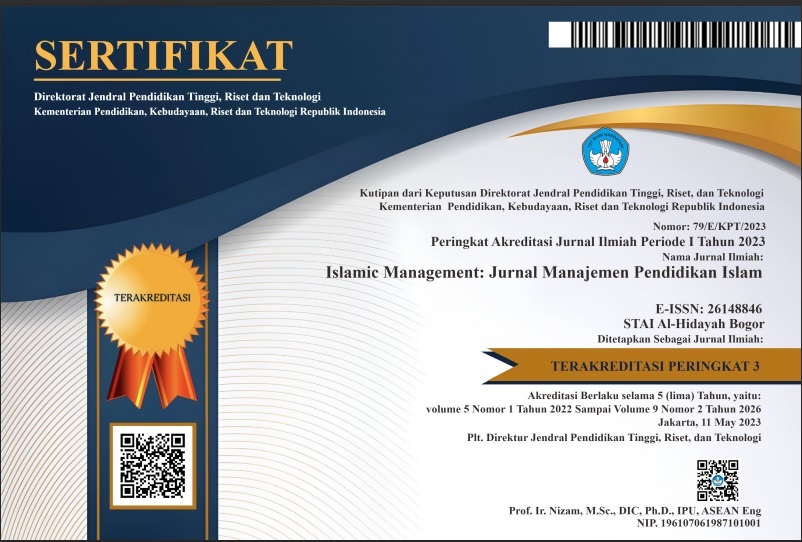ANALYSIS OF CONTINGENCY LEADERSHIP AND SITUATIONAL LEADERSHIP ON JOB SATISFACTION THROUGH WORK MOTIVATION AS A MEDIATING VARIABLE
DOI:
https://doi.org/10.30868/im.v8i01.7794Keywords:
Contingency Leadership, Situational Leadership, Job Satisfaction, Job MotivationAbstract
This study examines the effect of contingency leadership style and situational leadership on job satisfaction with work motivation as a mediating variable. The phenomenon of the problem raised is the low job satisfaction of employees at Altha Medika Dua Clinic Sukabumi, which can have a negative impact on productivity and service quality. This study aims to analyze the extent to which the two leadership styles affect job satisfaction and the role of work motivation in this relationship. The research method used was a quantitative method with a survey approach using questionnaires distributed to 30 employees of Altha Medika Dua Clinic Sukabumi. The data analysis technique used Structural Equation Modeling (SEM) with the PLS program. The data collected included primary data from questionnaires and secondary data from literature studies. The results showed that both contingency leadership and situational leadership had a positive and significant influence on job satisfaction. In addition, work motivation is proven to mediate the relationship between contingency and situational leadership on job satisfaction. Work motivation itself also has a significant influence on job satisfaction. These results indicate the importance of adaptive and situational leadership and increased work motivation to improve employee job satisfaction at Altha Medika Dua Clinic Sukabumi.
References
Eti. (2023). Perbedaan Klinik Pratama dan Utama Menurut Permenkes. Ksatria Ehospital.
Gautama, C., & Marchyta, N. K. (2022). Pengaruh Motivasi Kerja Terhadap Kepuasan Kerja Melalui Kesesuaian Kompensasi Pada CV. Opto Elektronik Di Kota Makassar. Jurnal Agora, 10(2), 1–18.
Hardani, Nur Hikmatul Auliya, G. C. B., Helmina Andriani, M. S., Roushandy Asri Fardani, S.Si., M. P., Jumari Ustiawaty, S.Si., M. S., Evi Fatmi Utami, M.Farm., A., Dhika Juliana Sukmana, S.Si., M. S., & Ria Rahmatul Istiqomah, M. I. K. (2017). Metode Penelitian Kualitatif&Kuantitaif. In Metode Penelitian Kualitatif&Kuantitaif (Vol. 53, Issue 9).
Hardono. (2020). Pengaruh Kepemimpinan Kontinjensi dan Kepemimpinan Situational Terhadap Kepuasan Kerja. The Journalish: Social and Government.
Hartono. (2018). Pengaruh Kepemimpinan Situasional Terhadap Kinerja Karyawan Melalui Kepuasan Kerja dan Organizational Citizenship Behavior Sebagai Variabel Intervening (Studi Kasus Pada Kantor PT Nindya Karya Cabang Makassar). Universitas Hasanuddin Makassar.
Khafid, A., Daud, I., & Ayesha, I. (2023). Unlocking Employee Performance: The Influence of Situational Leadership and Decision-Making via Job Satisfaction in the Automotive Industry in Jakarta Sabil í ½í ¶í ½í. SEIKO : Journal of Management & Business, 6(2), 555–566.
Kiswanto, M. H. (2018). Pengaruh Gaya Kepemimpinan Terhadap Motivasi Bekerja Karyawan Kantor Surakarta. New England Journal of Medicine, 372(2), 2499–2508.
Koniswara, S., & Lestari, T. S. (2019). Gaya Kepemimpinan Situasional Terhadap Motivasi Kerja Karyawan Pada Pt Garuda Indonesia (Persero) Tbk Cabang Kupang. EKOBIS : Jurnal Ilmu Manajemen Dan Akuntansi, 7(1), 1–15. https://doi.org/10.36596/ekobis.v7i1.69
Mappamiring. (2020). Motivasi dan Kepemimpinan terhadap Kepuasan Kerja Karyawan PT. Telelekomunikasi Indonesia (Persero) Tbk Pusat Makassar. Jurnal Administrasi Bisnis (JAB), 10(2), 86–92.
Nurwahidah, S., Ramdan, A. M., Sukabumi, U. M., Sukabumi, U. M., & Sukabumi, U. M. (2023). Analisis gaya kepemimpinan demokratis dan kaderisasi kepemimpinan terhadap kinerja karyawan. 13(2), 128–139.
Prasetiyo, E. J., Ratnasari, S. L., & Hakim, L. (2020). ANALISIS GAYA KEPEMIMPINAN, KOMITMEN ORGANISASIONAL, BUDAYA ORGANISASI, DAN LINGKUNGAN KERJA TERHADAP KEPUASAN KERJA KARYAWAN. JURNAL DIMENSI, 9(2). https://doi.org/10.33373/dms.v9i2.2531
Rinda, R. T., Maulana, H., & Fitriani, T. (2020). Pengaruh Gaya Kepemimpinan Dan Lingkungan Kerja Terhadap Kepuasan Kerja Karyawan Pt. Pln (Persero) Rayon Watampone. Journal Ekonomi Manajemen Dan Akuntansi STIE Wira Bhakti Makassar Internasional, 8(1). https://doi.org/10.47151/jeaswb.v8i1.19
Sahetapy, R. Y., Marihi, a O., Bauw, A., & Sawir, M. (2018). Pengaruh Gaya Kepemimpinan Terhadap Kinerja Karyawan yang Dimediasi oleh Motivasi Kerja dan Budaya Kerja pada Kantor Dinas Perhubungan Provinsi Papua. Majalah Ilmiah UNIKOM, 16(2), 185–188. https://doi.org/10.34010/miu.v16i2.1361
Samsuri. (2021). Pengaruh Gaya Kepemimpinan Situasional terhadap Kinerja Pegawai. Ekonomi Bisnis, 1(1), 81–98.
Timori Kansaki, Ngajudin Nugroho, Fauzi Akbar Maulana Hutabarat, Elserra Siemin Ciamas, & Arwin. (2021). Gaya Kepemimpinan Terhadap Motivasi Kerja Gen-Z (Studi Kasus pada Mahasiswa Politeknik Cendana Medan). ARBITRASE: Journal of Economics and Accounting, 2(2), 46–50. https://doi.org/10.47065/arbitrase.v2i2.284
Downloads
Published
How to Cite
Issue
Section
Citation Check
License
Copyright (c) 2025 Febi Wulansari, Asep Muhamad Ramdan, Resa Nurmala

This work is licensed under a Creative Commons Attribution-ShareAlike 4.0 International License.
Authors who publish with this journal agree to the following terms:
- Authors retain copyright and grant the journal right of first publication with the work simultaneously licensed under a Creative Commons Attribution License that allows others to share the work with an acknowledgment of the work's authorship and initial publication in this journal.
- Authors are able to enter into separate, additional contractual arrangements for the non-exclusive distribution of the journal's published version of the work (e.g., post it to an institutional repository or publish it in a book), with an acknowledgment of its initial publication in this journal.
- Authors are permitted and encouraged to post their work online (e.g., in institutional repositories or on their website) prior to and during the submission process, as it can lead to productive exchanges, as well as earlier and greater citation of published work (See The Effect of Open Access).






